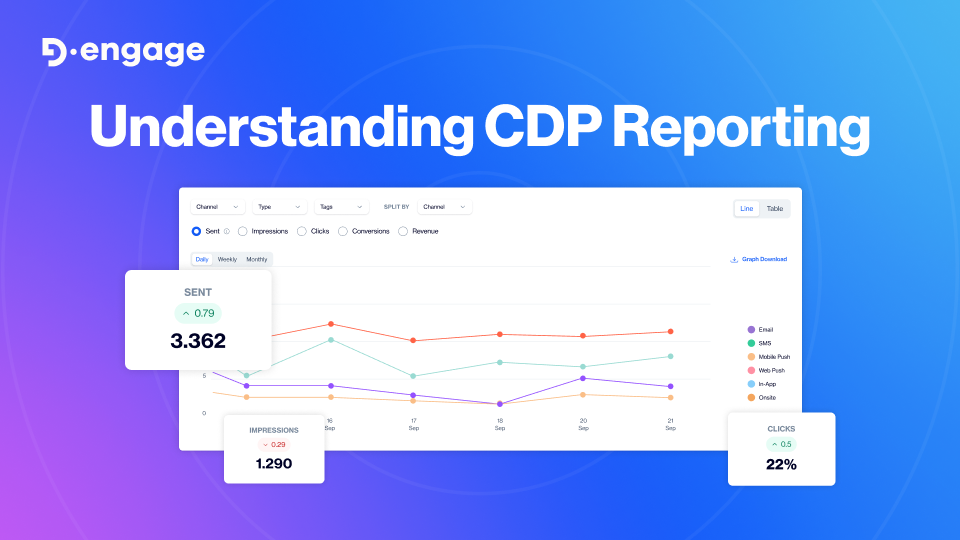As businesses increasingly rely on data to drive their marketing efforts, Customer Data Platforms (CDPs) have emerged as powerful tools for managing and analyzing customer information. At Dengage, we understand the importance of CDP reporting in empowering organizations with actionable insights. In this article, we’ll delve into what CDP reporting entails, its significance, and how it can benefit businesses.
What is a CDP?
A Customer Data Platform (CDP) is a centralized system that collects, organizes, and analyzes customer data from various sources, providing a unified view of customer interactions. Unlike traditional data management platforms (DMPs), CDPs focus on first-party data and prioritize individual-level identity resolution.
According to CDP.com, CDPs allow you to combine customer data from multiple sources, such as transactional systems, CRM platforms, and online interactions, to create comprehensive customer profiles.
The Importance of CDP Reporting
1. Data Consolidation
CDPs enable businesses to consolidate customer data from disparate sources into a single platform. This includes demographic information, purchase history, website interactions, and more. By centralizing data, organizations gain a holistic view of their customers’ behaviors and preferences.
“74% of organizations say they struggle to manage unstructured data” – Gartner
2. Enhanced Personalization
With access to unified customer profiles, businesses can personalize their marketing efforts at scale. CDP reporting provides insights into individual preferences, allowing organizations to deliver targeted messaging and tailored experiences.
“Personalized emails deliver 6x higher transaction rates” – Dengage
3. Improved Customer Engagement
By leveraging CDP insights, businesses can engage customers more effectively across various touchpoints. Whether through email marketing, social media campaigns, or personalized recommendations, organizations can foster meaningful interactions that resonate with their audience.
“Businesses that implement personalization see an average increase of 20% in sales” – CDP.com
4. Data-driven Decision Making
CDP reporting equips organizations with actionable insights to inform strategic decisions. By analyzing customer behaviors and trends, businesses can identify opportunities for growth, optimize marketing campaigns, and allocate resources more efficiently.
“Data-driven organizations are 23 times more likely to acquire customers” – Harvard Business Review
CDP Reporting Capabilities
1. Data Collection
CDPs can collect various types of customer data, including demographic information, behavioral data, and transactional records. This data is sourced from both online and offline interactions, providing a comprehensive view of customer journeys.
2. Identity Resolution
CDPs employ advanced identity resolution techniques to link disparate data points to individual customer profiles accurately. This enables organizations to recognize customers across channels and devices, facilitating personalized experiences.
3. Segmentation and Targeting
CDPs allow businesses to segment their customer base based on specific criteria, such as demographics, purchase history, or engagement levels. This segmentation enables targeted marketing campaigns tailored to different audience segments.
4. Analytics and Reporting
CDPs offer robust analytics and reporting capabilities, allowing organizations to measure the effectiveness of their marketing efforts and track key performance indicators (KPIs). These insights inform future strategies and optimizations.
Industry Insights and Statistics
According to Gartner, the CDP market is expected to reach $10.3 billion by 2025, growing at a CAGR of 29.3%.
According to the CDP Reports, 82% of businesses plan to increase their investment in CDPs over the next two years.
Research by CDP.com reveals that organizations using CDPs experience a 2.1x increase in customer lifetime value (CLV) and a 49% increase in customer retention rates.
Conclusion
CDP reporting plays a vital role in helping organizations leverage customer data to drive marketing strategies and enhance customer experiences. By consolidating data, enabling personalization, improving engagement, and facilitating data-driven decision-making, CDPs empower businesses to stay ahead in today’s competitive landscape.
At Dengage, we offer advanced CDP solutions that enable organizations to unlock the full potential of their customer data. Our platform provides comprehensive reporting and analytics capabilities, ensuring that businesses have the insights they need to succeed.
To learn more about how CDP reporting can benefit your organization, explore our product features and solutions today. Embrace the power of CDPs to drive meaningful and lasting relationships with your audience.
